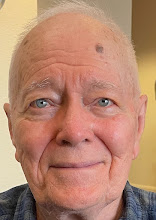Before assessing reading ability, one must be able to read.
Before one can read, one must acquire a vocabulary. Given the complexity of
American English, one must also know how to spell.
I did research on this matter with underprepared college freshmen in
a remedial biology class. The campus computer system presented a sentence from assigned
reading with a word missing. Students could enter one letter at a time to build
the complete word (they called it Wheel of Fortune). Many students could not
enter hints is this way. They insisted on typing an entire word. They had
learned to read by the look-say method that does not stress spelling. The most
unusual student read each word out loud, expect for tri-syllabic words or
larger, for which she inserted, “buzz”. Her explanation was that long words,
“really don’t count”.
My own experience in building a vocabulary was given a
gigantic boost after taking a series of aptitude tests at the Johnson O’Connor
Research Foundation in New York City during my second year in the USAF. I won
an Air Force wide contest to attend the IBM Customer Engineering School at
Endicott, New York, but the aptitude testing ranked me in the bottom 10% on
vocabulary! “A person’s vocabulary level was the best single measure for
predicting occupational success in every area.” And further, “…vocabulary
is not innate, … it can be acquired.”
I then spent several months while on duty in Japan reading
through the two-volume edition of The Johnson O’Connor English Vocabulary
Builder. It worked! I tested out of freshman English at Mizzou two years later,
but enrolled in both semesters anyway. You can still buy the book. Or you can
use related software from WordSmart’s.
We are not talking flashcards here. The point is to embed a word in a
meaningful matrix of relationships, such that it has a meaning, for which the
word is the label. The Vocabulary Builder also presents good examples of
grammar.
The Educational Software Cooperative (ESC) lists a
number of authors
teaching vocabulary, spelling and phonics. The key to success is that the
student wants to learn. Vocabulary empowers. The high performance teacher has
that unique ability to promote student engagement, in person or by way of
software (educational
games). Crossword puzzles are a fun way of teaching spelling and
vocabulary. Crossdown and “other cool sites” let you
create puzzles from your current spelling lists and other topics, as well as play
online.
The oldest, time proven, phonics, spelling and vocabulary program to be
listed under English,
Animated Beginning Phonics, uses
animation to entice young students to persist. An animated character speaks the
word or you record the sound for the student to hear in the next advancement
listed under Vocabulary
and Spelling. Next comes the software for teaching word recognition,
meanings, and origin by Merit Software.
Today this software is fully developed online as are the remaining ESC offerings
in this category. Spelling and vocabulary are included in the reading and
writing online software discussed in the previous post. You must check each list
and software category
for the one that fits your needs the best.
How students use the software determines what they get out
of it. Reading aloud and spelling can be conducted at the lowest levels of
thinking with any in-person or software presentation. An empowering vocabulary
is created when the student wants to learn and the words are truly labels for
meaningful observations and relationships. The reader then experiences what the
words represent. The accomplished reader can then command a given situation by
use of meaningful words. The world would be so different if people took the
time to actually understand one another. IMHO that would mean the end of
traditional right count scored multiple-choice NCLB tests. If not the end, at
least scoring for quantity and quality (as found in PUP,
Winsteps and Amplifire) would be offered as an
alternative choice to the current gambling.

No comments:
Post a Comment